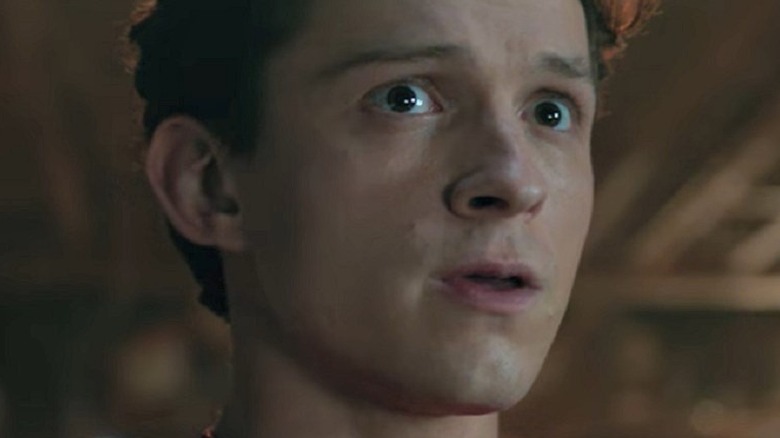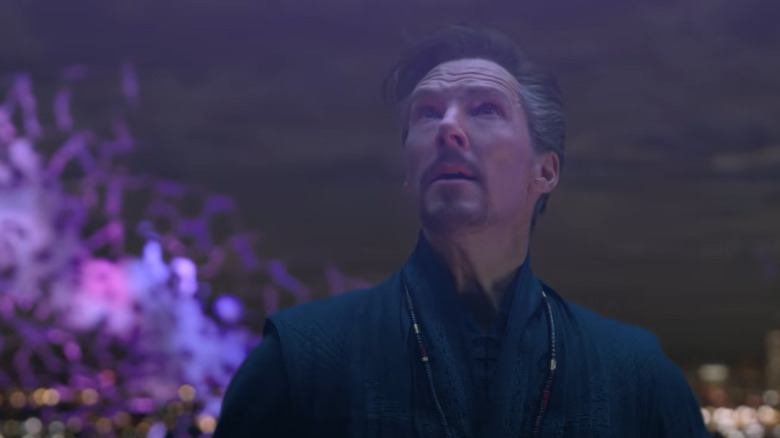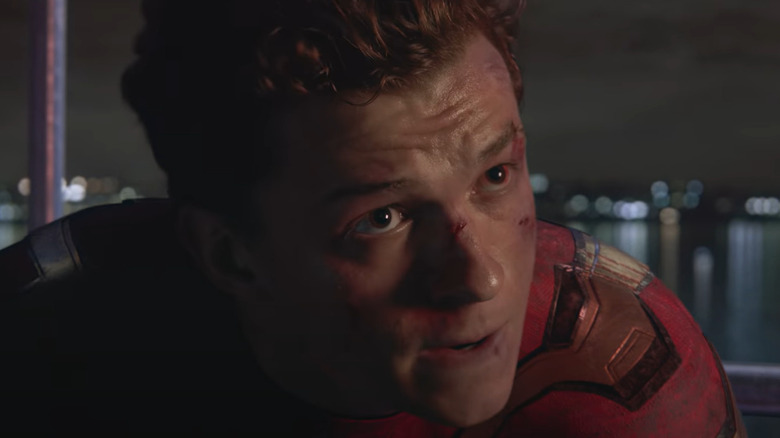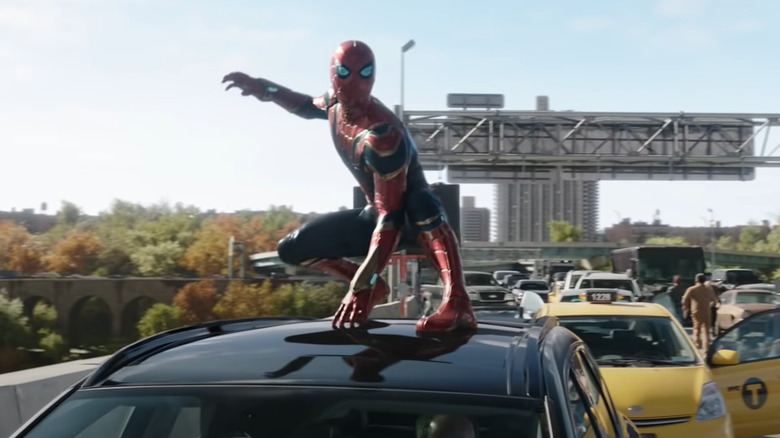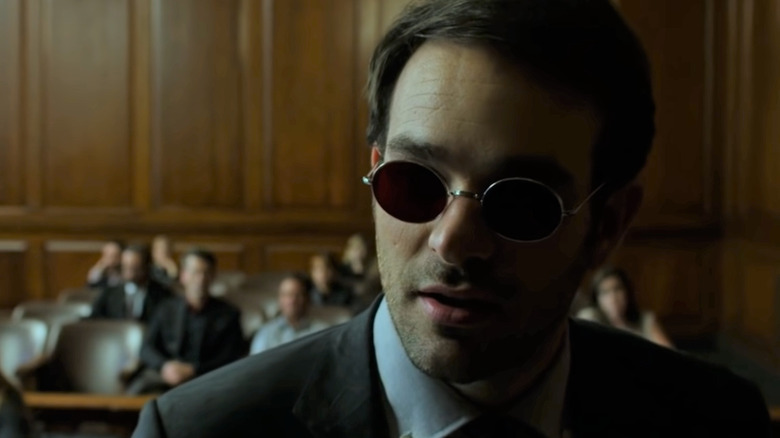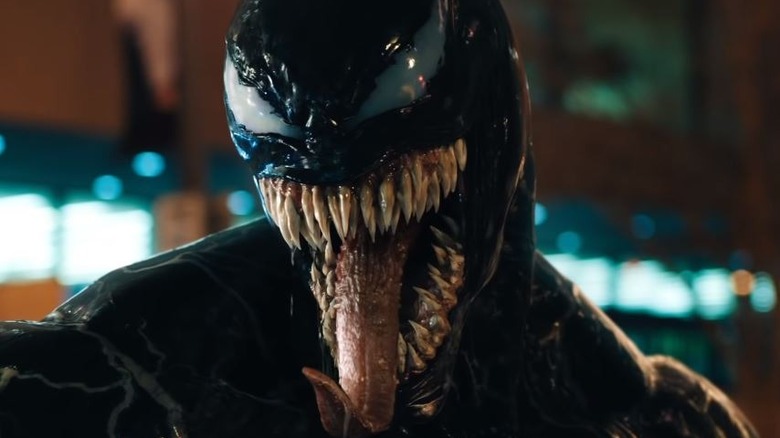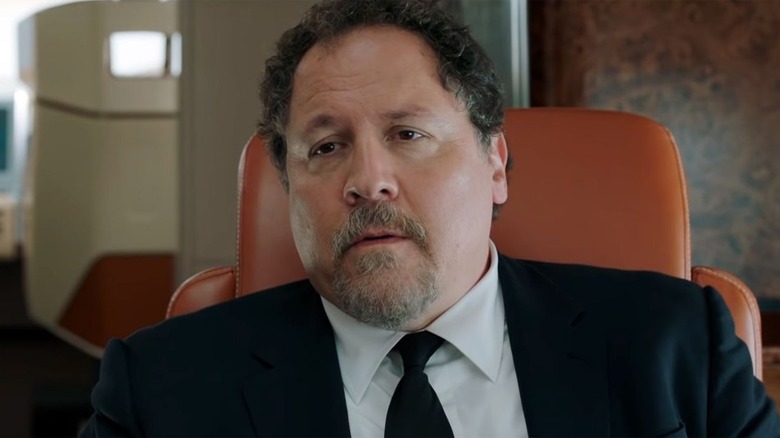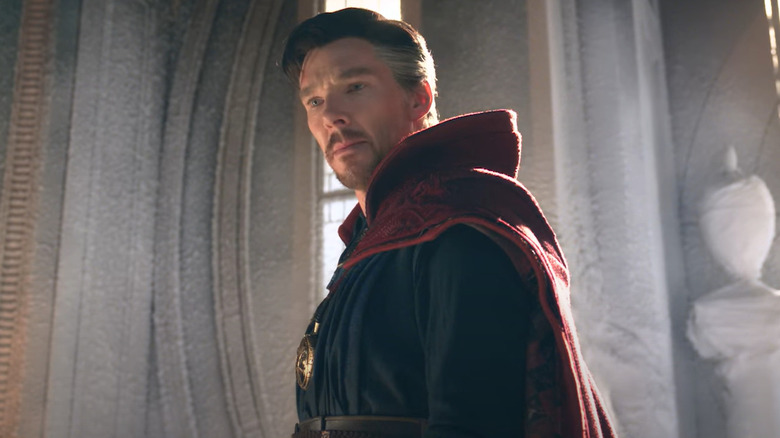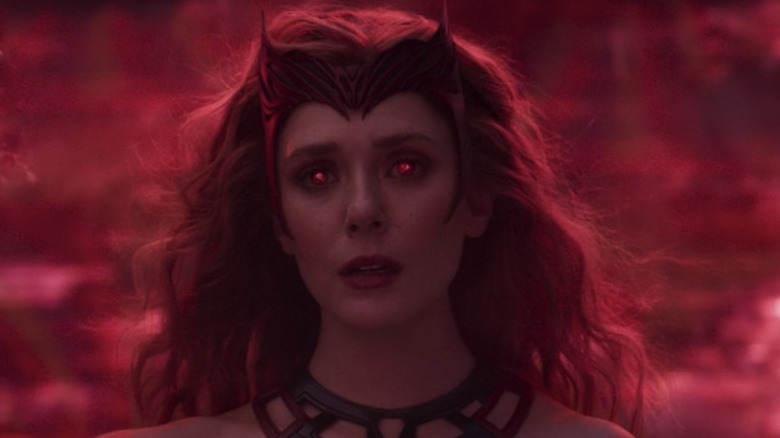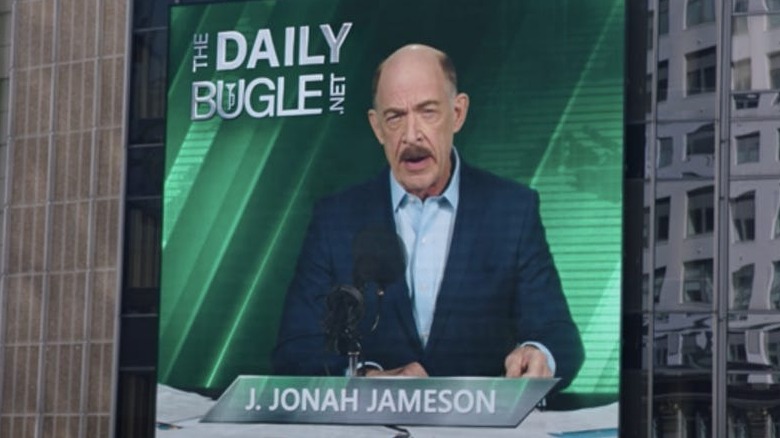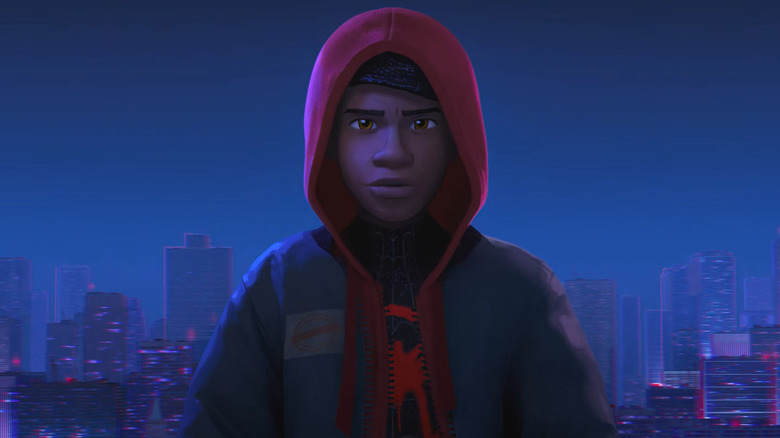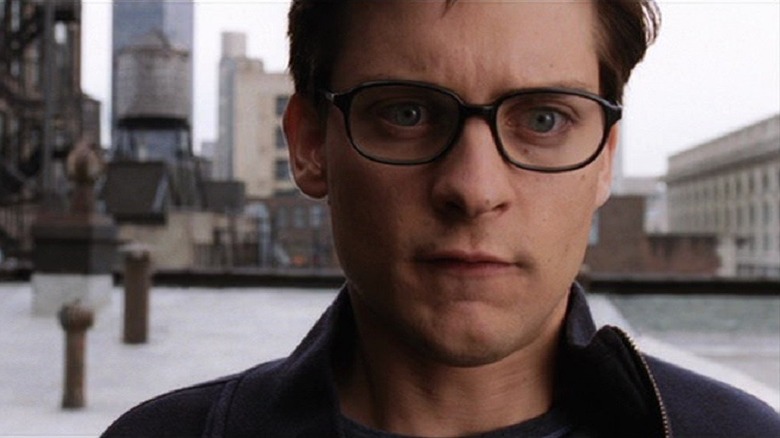How Spider-Man: No Way Home Is Going To Change The MCU Forever
"No Way Home," the third installment in the MCU's standalone "Spider-Man" series, has a whole lot going on. The world knows Peter Parker is Spider-Man, and a lot of people aren't happy about it. Plus, villains from alternate universes have arrived and are ready to tear Peter apart. Part culmination of a three-film story arc, part throwback to movies gone by, "Spider-Man: No Way Home" is a superhero epic that honors the last two decades of big-screen Spidey outings while hinting at more adventures in the webhead's future.
A story this grand, with moments so monumental, is definitely going to have repercussions. From the introduction of classic heroes to the loss of beloved characters, the events of "No Way Home" are bound to form ripples that will spread across the MCU, perhaps altering it in unexpected ways. While not a definitive list, here are just a few obvious examples of how "Spider-Man: No Way Home" is going to change the MCU forever.
Warning — major spoilers below.
An infinite number of heroes and villains
When Quentin Beck revealed Spider-Man's identity at the end of "Spider-Man: Far From Home," Peter's life turned into chaos immediately. He was swarmed by strangers blaming him for the death of Mysterio. Then charges were placed against him by the Department of Damage Control, forcing him to recruit a very good — and very familiar — lawyer. On top of that, both MJ and Ned were rejected from attending MIT due to their association with Peter.
Desperate to make sure his friends' lives return to normal, Peter seeks the help of Doctor Strange to make the world forget that he's Spider-Man. While the good doctor performs his spell, Peter continues to add contingencies, making sure the people he wants to know his identity still do. This causes the spell to go out of control, pulling in individuals from across the multiverse who already know Spider-Man's alter ego.
Strange explains that there's an infinite number of universes with an infinite number of villains who know Peter's identity. This suggests that there's also an infinite number of heroes out there as well. Now the possibilities for future stories are limitless. New and old versions of characters can be introduced at any time, making the MCU more vast and rich with storytelling possibilities than ever before.
Peter Parker no more
Spider-Man has always worked best when he's in over his head and everything he does seems to make everything worse. In "Spider-Man: No Way Home," he's essentially responsible for everything that happens. If he'd listened to Doctor Strange, then Doc Ock, Green Goblin, Sandman, the Lizard, and Electro wouldn't be running amok in the first place. Also, if he'd let Doctor Strange send them back when he meant to, unnecessary deaths would've been avoided.
Still, Spider-Man has to do what he believes is right, and sending these villains back is something he can't live with. So he gets some help from parallel versions of himself, played by Tobey Maguire and Andrew Garfield, to cure these men and send them back safely. However, virtuous as their actions are, the rest of the multiverse is about to be pulled through and rip reality apart. So, in order to save everyone and everything, Peter convinces Doctor Strange to cast a spell that would erase the memory Peter Parker from everyone's memory, as though he never existed.
While the repercussions of this seem to only affect Peter, this also means his identity is unknown to the Avengers, making him an outcast. Perhaps they won't trust him as readily as they would have otherwise because they don't know who he is. Although audiences will know him and the sacrifice he made, Peter will remain a mystery to the rest of the MCU.
The return of your friendly neighborhood Spider-Man
If there's one positive to the tragic sacrifice Peter makes in the climax of "No Way Home," it's that he's free to write his future any way he sees fit. He isn't bound to protecting his Aunt May, MJ, or Ned. Since May is gone and his friends don't remember him, any future villain who figures out his identity won't see any connection between Peter and his loved ones. This means his personal life is no longer a weakness.
In the final moments of the film, we see Peter's new apartment has a sewing machine, complete with some brightly colored red and blue fabric. The next thing you know, Spidey is running along rooftops and slinging over 30 Rock in a brand new, homemade suit. With no more connection to Happy Hogan, Peter doesn't have access to Tony Stark's technology, so no more technologically advanced suits making him more powerful than he already is.
While it's not yet clear if he still has any connection with the Avengers, it's certainly possible that he won't be venturing back out into space anytime soon. Without a special suit and no obvious obligation to be a team player, it's very likely that Spider-Man will go back to his original role as a more street-level hero.
Welcome the Man without Fear
Peter gets in trouble with the law once his identity is revealed, and after a montage of questions from the Department of Damage Control, things look grim for our hero and his loved ones. If any of them want to avoid jail time, they'll need the help of a good lawyer. Luckily, New York City just so happens to be the home of a blind attorney who many Marvel fans should be familiar with.
Yes, it's revealed in the very next scene that Matt Murdock himself has come in to advise Peter Parker on his current legal issues. Murdock is, of course, the secret identity of the classic Marvel hero Daredevil. The first time audiences saw him on the big screen was in the 2003 film starring Ben Affleck in the title role, although this was years before the MCU. Over a decade later, Netflix and Marvel Studios released a TV reboot, which saw English actor Charlie Cox take on the role.
Cox returns to his role in "No Way Home," tying the film in with the Netflix series. This cameo was on the heels of Marvel's most famous crime lord, the Kingpin (Vincent D'onofrio), being revealed in the penultimate episode of the Disney+ series "Hawkeye." Bringing these characters into the MCU fold can only mean that we'll be seeing more grounded, street-level heroes and villains in the future. This would be a major change of pace for a series of films that has primarily focused on larger-than-life heroes.
Enter Venom
During the post-credits scene of "Venom: Let there Be Carnage," it's revealed that Tom Hardy's Eddie Brock has somehow been transported to an alternate reality. Here, Eddie sees a TV broadcasting J. Jonah Jameson's report that Spider-Man killed Mysterio and that his secret identity is Peter Parker. Since the "Venom" movies don't take place within the traditional MCU, Eddie has no idea what any of that means. Venom, on the other hand, seems to have some understanding, as he becomes very excited at the prospect of meeting this Spider-Man.
This scene suggested there could be an appearance from the legendary Spidey foe in "No Way Home." Well, in a mid-credits sequence, we see Eddie Brock getting a rundown of this universe's surplus of super-people from a bartender in Mexico. He and Venom have some of their usual banter before both are sent back to their original dimension, dashing any hopes of seeing this Venom face off against Peter Parker.
However, we do see that a small bit of the symbiote stays behind. Before going back to the credits, the symbiote begins crawling away, perhaps on a mission to find Peter. This suggests that the MCU is about to have its own unhinged alien creature running around. Depending on the host it comes in contact with, this could spell danger for the rest of the MCU.
Happy Hogan alone
As the director of "Iron Man" in 2008, Jon Favreau is one of the founding fathers of the Marvel Cinematic Universe. Not only did his duties behind the scenes help shape it into what it is today, his on-camera role as Tony Stark's assistant, Happy Hogan, has only grown in importance over the years. By the time "Spider-Man: Homecoming" came around, he was Peter's contact to Tony Stark. If Peter needed anything, he was to call Happy.
By "Spider-Man: Far From Home," Tony Stark was dead, but Happy was still doing whatever he could to help Spider-Man. He was also, sort of, dating Aunt May. At least, he thought they were dating. Turns out, she just considered it a fling. This debate over their relationship status carries over to "No Way Home," where Happy is clearly heartbroken over discovering his feelings for May are not reciprocated.
Devastatingly, May didn't survive the events of "No Way Home," ensuring that she and Happy have no future. Later, we see that Doctor Strange's spell to make the world forget Peter Parker has also affected Happy. Now, he has no romantic interest and no Peter. While it's been hinted that Happy has other duties, May and Peter were clearly the lights of his life. What will the MCU look like if Happy has no one? Only the future can tell us.
The Multiverse of Madness
Instead of the usual post-credits scene setting up the next Marvel film, "Spider-Man: No Way Home" premiered a teaser trailer for "Doctor Strange in the Multiverse of Madness." The first images shown in the trailer are that of the wreckage following the botched spell to make the world forget that Peter Parker is Spider-Man. We also hear Strange's voiceover, repeating his warning about the multiverse to Peter.
This would suggest that the events of "No Way Home" lead directly into the "Multiverse of Madness." While several details about the film have yet to be revealed, it's made clear that a darker Stephen Strange — possibly the one featured in the Disney+ animated series "What if..?" — is endangering the entire universe.
Although he may no longer be the Sorcerer Supreme due to a technicality, Doctor Strange is still an incredible powerful figure in the MCU. So powerful, in fact, that he was able to keep the borders of the multiverse secure long enough for Peter to come up with a plan to save everyone. Luckily, Stephen's instincts are to protect this universe rather than destroy it. So the idea of an equally powerful Doctor Strange who would rather destroy the universe is a terrifying one.
Rise of the Scarlet Witch
It was revealed in the teaser for "Doctor Strange in the Multiverse of Madness" that Stephen seeks the help of Wanda Maximoff in dealing with his evil twin from another universe. At first, she thinks he's there to confront her regarding the events detailed in the Disney+ series "WandaVision." However, he instead explains that there's something more important going on.
First introduced to the MCU in "Avengers: Age of Ultron," Marvel fans have known of Wanda's alias, Scarlet Witch, for years. However, it wasn't until a confrontation with Agatha Harkness in "WandaVision" that the name had ever been mentioned. Wanda's grief over losing Vision had been so great that she subconsciously manufactured a sitcom reality around her where the couple could live as a family. Apparently that kind of power, according to Agatha, has rarely been seen before, and it might just be the tip of the iceberg.
One of the final images of the Disney+ series is Wanda living in isolation while studying some ancient magic. So we've only been given glimpses of the Scarlet Witch's full power, with the promise of more to come. Since "No Way Home" ties directly into the Doctor Strange sequel, it might be responsible for showing us just what the Scarlet Witch is capable of.
Misinformation in the MCU
J. Jonah Jameson has been a thorn in Spider-Man's side since pretty much the beginning. The angry, cigar-chomping head of the Daily Bugle has always seen Spidey as nothing more than a menace, and he has a long tradition of taking any story about the wall-crawler and spinning it to fit his own personal narrative.
J. K. Simmons brought the character to the big screen in the original "Spider-Man" back in 2002. He then appeared in its two sequels, but the character was strangely absent from both installments of "The Amazing Spider-Man" films. Luckily for fans (but not so luckily for Spidey), Simmons reprised the role at the end of "Spider-Man: Far From Home" in order to spread the lie that Spider-Man murdered Mysterio and to out Peter Parker.
In "No Way Home," we see that Jameson is basically running his own news studio out of his house. As the film progresses, however, he moves into a much bigger space and has a staff at his disposal. It would appear that his rhetoric is catching on and his audience is growing. If this fringe loudmouth is breaking through to the mainstream, what does that mean for the rest of the MCU? His lies already lead to New York citizens turning on Spider-Man. Just imagine if he turned his ire on the rest of the Avengers.
Miles Morales is out there
The character of Miles Morales was first introduced in the comic "Ultimate Fallout #4" in 2011. Another kid from New York, Brooklyn specifically, Miles was also bitten by a spider that changed his biological makeup, giving him similar powers to Spider-Man. Following the death of Peter Parker in the comics' Ultimate universe, Miles stepped up and became the new Spider-Man.
The character really broke into the mainstream with the Academy Award-winning animated film "Spider-Man: Into the Spider-Verse." The film was such a success that two sequel are on the way. The character had been hinted at in "Spider-Man: Homecoming," but he's yet to make an appearance. However, "No Way Home" makes a fun reference to the character, without officially bringing him in.
When Andrew Garfield's Peter Parker removes his mask to a newly cured Electro, the villain can't help but be disappointed. He'd assumed Spider-Man was Black. He then observes that there's got to be a Black Spider-Man out there somewhere. Since the film deals with the multiverse, it's a natural assumption for Electro to make. However, this could also serve as a wink to the audience that Miles Morales is indeed coming.
Everything is canon
Perhaps the biggest revelation in "Spider-Man: No Way Home" happens early in the film when Doctor Strange explains that there are an infinite number of people who know Spider-Man's identity throughout the multiverse. Then, by bringing in characters from previous "Spider-Man" films, it essentially canonizes them. These aren't just actors making cameos — they're playing the same characters. Therefore, those movies now exist within the MCU.
Previously, the MCU was limited to films produced by Disney and Marvel Studios. The "X-Men" films, "Fantastic Four," and others existed in their own continuity. Now that we've seen even more of the multiverse, it's clear that those films are equally as valid. They may not take place in the same universe as traditional MCU movies, but there's no reason to believe they don't exist in this newly expanded multiverse.
What "No Way Home" says, when all is said and done, is that all of it counts. Every single incarnation of these iconic characters is out there somewhere. Will they all be making an appearance in future installments? Does this mean we'll see the return of Dolph Lundgren's Punisher or David Hasselhoff's Nick Fury? Probably not. However, in this new status quo, whether it's animated, live-action, forgotten, or just plain bad, everything that's come before is, in its own way, finally canon.
